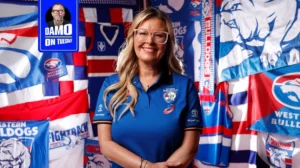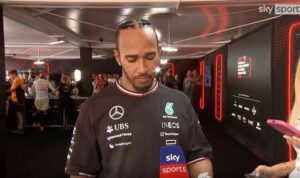The leading player’s agent predicts that rivals will find it harder to reward their clubs’ marquee players with a burst of mega-long contracts.
In a week with Clayton Oliver’s future up in the air despite a contract keeping him with Melbourne until 2030, the Western Bulldogs fended off at least four suitors for Aaron Naughton and signed him to an eight-year deal that will keep him at Whitten Oval. until the end of the season (2032). Aaron Naughton has signed an eight-year deal that will keep him at the Western Bulldogs until 2032. Aaron Naughton has signed an eight-year deal that will keep him at the Western Bulldogs until 2032.
Ten years after Sydney and Lance Franklin stunned the world with a nine-year elite contract, contracts of similar length are no longer uncommon for elite players and even non-elite players.
This year, Sydney young gun Nick Blakey signed a seven-year deal that will keep him in red and white until 2031, while Fremantle fullback Brennan Cox, who has not won a best and fairest award or been named an All-Australian, has shown promise. . his future purple until 2030.
At least 20 players are under contract until 2029, including Carlton’s Coleman Medalists Charlie Curnow (six years until 2029) and Harry McKay (seven years until 2030), Christian Petracca (Melbourne seven years until 2029) and Callum Mills (Sydney, six years) . 2029). You can browse them in the image below. Long contracts fell out of fashion in the 2000s when Anthony Koutoufides (Carlton), Mark Mercuri (Essendon), Aaron Hamill (St Kilda) and four-year deals with Nick Holland (Hawthorn) failed to materialise. to their clubs due to a player’s loss of form and injury.
They returned to the league after introducing free agency and adding Gold Coast and Greater Western Sydney, but have exploded in recent seasons.
There was a time when long-term deals were necessary to attract a player to a club. It is logical that they must now preserve their talents.
Naughton has withdrawn Sydney’s 10-year bid to stay with the Dogs, while West Coast, Collingwood, Geelong and a number of other clubs are circling, a source familiar with the matter said.
Who comes and who goes? A guide to the trade deadline and free agency
One agent said it’s harder to get elite players now.
“Yeah, when they’re doing well, that’s what we saw with Naughton,” said the agent, who spoke on condition of anonymity so he could be more open. “The players are mostly very, very loyal.”
The agent also wisely visited Port Adelaide premiership turned pundit Kane Cornes, a vocal critic of long contracts. “I love Kane Cornes but he can never be a leader because he would lose a million players,” said the agent. “You don’t keep Aaron Naughton because you don’t give him those years and he goes to Sydney.”
The appeal of such contracts for player and club is that they offer security and certainty. Players have money in the bank to invest and plan for the future, while clubs have the flexibility to change the salary cap to distribute the money every year.
“When you have that many contacts, you can easily transfer money,” said one list manager, who spoke on condition of anonymity because of the sensitivity of the subject.
“You might have to move for a year to get something else. You can transfer 200 [thousand] back or distribute elsewhere. If you have two-year contracts, you can’t. You put it off one year and it hits you the next.”
Cornes said history, with the exception of Lance Franklin and Dustin Martin, had shown long-term deals don’t work, evidenced by the success of Hawthorn and Geelong following the departures of Franklin and Gary Ablett.
Greater Western Sydney also bounced from 16th place to the semi-finals after losing Tim Taranto and Jacob Hopper – whose exits allowed Tom Green and Stephen Coniglio to spend more time in midfield and made choices that enabled the Giants. get Aaron Cadman’s number one.
“Players get too comfortable, no matter how well they play, their bodies, their preparation, there’s no incentive to give them a false sense of security,” Cornes said.
“Then obviously the club can’t get out of that [contract] and if you do it devalues the value of the player and you never get market value for them.
“I can’t think of many positive reasons why you would.”
But he said Nick Daicos and Jason Horne-Francis, both graduating sophomores, are exceptions because of their age and considerable talent.
While the ability for clubs to pay a chunk of salary to get a player out – like Brodie Grundy’s situation with Collingwood – was not ideal, the agent said it was the “cost of doing business”. “If you’ve never been lost, you’ve never had a crack,” the agent said.
The list leader said that clubs are willing to take risks to keep the gun.
“Normally, you might have to pay some money, but you have to consider the loss of missing him next year,” said the list manager. “You have to live in the present moment as well.
“The competition is very balanced. You are not that far away. Every year you wait and do nothing, your better players are a year older and







